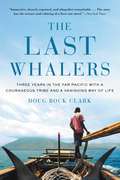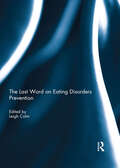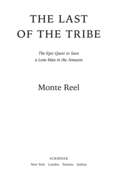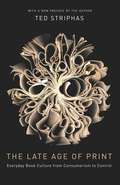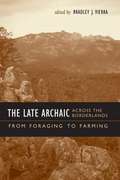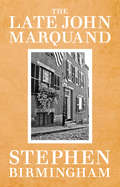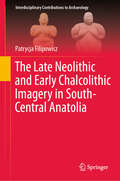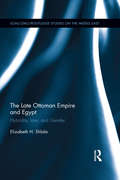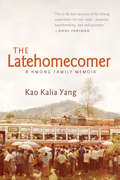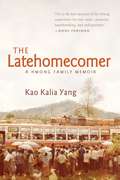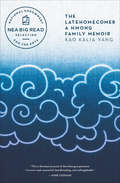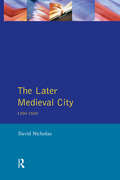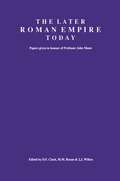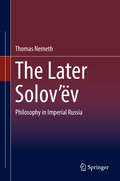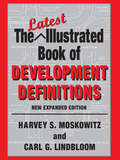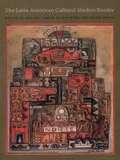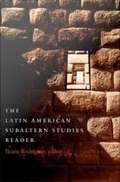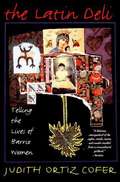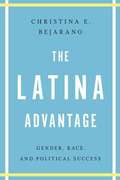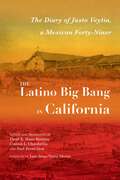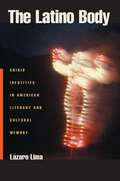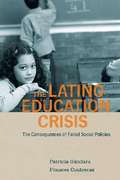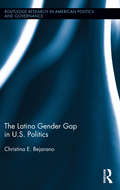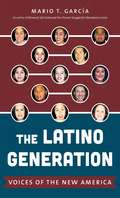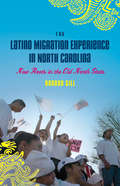- Table View
- List View
The Last Whalers: Three Years in the Far Pacific with a Courageous Tribe and a Vanishing Way of Life
by Doug Bock Clark<P><P>On a volcanic island in the Savu Sea so remote that other Indonesians call it "The Land Left Behind" live the Lamalerans: a tribe of 1,500 hunter-gatherers who are the world's last subsistence whalers. They have survived for half a millennium by hunting whales with bamboo harpoons and handmade wooden boats powered by sails of woven palm fronds. <P><P>But now, under assault from the rapacious fores of the modern era and a global economy, their way of life teeters on the brink of collapse. <P><P>Award-winning journalist Doug Bock Clark, one of a handful of Westerners who speak the Lamaleran language, lived with the tribe across three years, and he brings their world and their people to vivid life in this gripping story of a vanishing culture. Jon, an orphaned apprentice whaler, toils to earn his harpoon and provide for his ailing grandparents, while Ika, his indomitable younger sister, is eager to forge a life unconstrained by tradition, and to realize a star-crossed love. Frans, an aging shaman, tries to unite the tribe in order to undo a deadly curse. And Ignatius, a legendary harpooner entering retirement, labors to hand down the Ways of the Ancestors to his son, Ben, who would secretly rather become a DJ in the distant tourist mecca of Bali. <P><P>Deeply empathetic and richly reported, The Last Whalers is a riveting, powerful chronicle of the collision between one of the planet's dwindling indigenous peoples and the irresistible enticements and upheavals of a rapidly transforming world.
The Last Word on Eating Disorders Prevention
by Leigh CohnFor the first time in one volume, many of the world’s most esteemed eating disorders prevention experts share their opinions and recommendations about future directions for the field. Employing "The Last Word" format of writing concise editorials about a focused area of research, authors from four countries contribute thirteen chapters with diverse points of view. The approaches range from large scale, macro-environmental calls for change through public policy to the more intimate promotion of positive youth identity for buffering against eating disorders. Included are retrospective looks at the development of prevention programs with an eye toward best practices moving forward, calls for integrating eating disorders interventions with existing efforts in the obesity and health promotion fields, examples of successful change through public policy and social justice, and a cry for gender inclusiveness, which has missing in female dominated strategies. More personal-level recommendations look at the efficacy of mindfulness, yoga, intuitive eating and exercise, and the importance of forming healthy self-identity. Informed by decades of investigation, the authors—all of whom have conducted numerous studies, programs, and research projects—offer the insights they’ve learned and the lessons that they each believe will make a difference in reducing eating disorders. This book was originally published as a special issue of Eating Disorders: The Journal of Treatment and Prevention.
The Last of the Tribe
by Monte ReelThroughout the centuries, the Amazon has yielded many of its secrets, but it still holds a few great mysteries. In 1996 experts got their first glimpse of one: a lone Indian, a tribe of one, hidden in the forests of southwestern Brazil. Previously uncontacted tribes are extremely rare, but a one-man tribe was unprecedented. And like all of the isolated tribes in the Amazonian frontier, he was in danger. Resentment of Indians can run high among settlers, and the consequences can be fatal. The discovery of the Indian prevented local ranchers from seizing his land, and led a small group of men who believed that he was the last of a murdered tribe to dedicate themselves to protecting him. These men worked for the government, overseeing indigenous interests in an odd job that was part Indiana Jones, part social worker, and were among the most experienced adventurers in the Amazon. They were a motley crew that included a rebel who spent more than a decade living with a tribe, a young man who left home to work in the forest at age fourteen, and an old-school sertanista with a collection of tall tales amassed over five decades of jungle exploration. Their quest would prove far more difficult than any of them could imagine. Over the course of a decade, the struggle to save the Indian and his land would pit them against businessmen, politicians, and even the Indian himself, a man resolved to keep the outside world at bay at any cost. It would take them into the furthest reaches of the forest and to the halls of Brazil's Congress, threatening their jobs and even their lives. Ensuring the future of the Indian and his land would lead straight to the heart of the conflict over the Amazon itself. A heart-pounding modern-day adventure set in one of the world's last truly wild places, The Last of the Tribe is a riveting, brilliantly told tale of encountering the unknown and the unfathomable, and the value of preserving it.
The Late Age of Print: Everyday Book Culture from Consumerism to Control
by Ted StriphasTed Striphas argues that, although the production and propagation of books have undoubtedly entered a new phase, printed works are still very much a part of our everyday lives. With examples from trade journals, news media, films, advertisements, and a host of other commercial and scholarly materials, Striphas tells a story of modern publishing that proves, even in a rapidly digitizing world, books are anything but dead. From the rise of retail superstores to Oprah's phenomenal reach, Striphas tracks the methods through which the book industry has adapted (or has failed to adapt) to rapid changes in twentieth-century print culture. Barnes & Noble, Borders, and Amazon.com have established new routes of traffic in and around books, and pop sensations like Harry Potter and the Oprah Book Club have inspired the kind of brand loyalty that could only make advertisers swoon. At the same time, advances in digital technology have presented the book industry with extraordinary threats and unique opportunities. Striphas's provocative analysis offers a counternarrative to those who either triumphantly declare the end of printed books or deeply mourn their passing. With wit and brilliant insight, he isolates the invisible processes through which books have come to mediate our social interactions and influence our habits of consumption, integrating themselves into our routines and intellects like never before.
The Late Archaic across the Borderlands: From Foraging to Farming
by Bradley J. VierraWhy and when human societies shifted from nomadic hunting and gathering to settled agriculture engages the interest of scholars around the world. One of the most fruitful areas in which to study this issue is the North American Southwest, where Late Archaic inhabitants of the Sonoran and Chihuahuan Deserts of Mexico, Arizona, and New Mexico turned to farming while their counterparts in Trans-Pecos and South Texas continued to forage. By investigating the environmental, biological, and cultural factors that led to these differing patterns of development, we can identify some of the necessary conditions for the rise of agriculture and the corresponding evolution of village life. The twelve papers in this volume synthesize previous and ongoing research and offer new theoretical models to provide the most up-to-date picture of life during the Late Archaic (from 3,000 to 1,500 years ago) across the entire North American Borderlands. Some of the papers focus on specific research topics such as stone tool technology and mobility patterns. Others study the development of agriculture across whole regions within the Borderlands. The two concluding papers trace pan-regional patterns in the adoption of farming and also link them to the growth of agriculture in other parts of the world.
The Late John Marquand
by Stephen BirminghamThe acclaimed social historian and author of Our Crowd presents a colorful portrait of the Pulitzer Prize–winning writer. John Marquand, the great literary satirist and chronicler of New England elites, could have been a character in one of his own beloved novels. Here, Stephen Birmingham presents a lively narrative of Marquand&’s life, drawing on personal interviews with friends and family. Raised in Newburyport, Massachusetts, Marquand was both an insider and outcast of the old money set. After attending Harvard and serving overseas in World War I, he began writing stories that captured the lives, manners, and morals of wealthy families confined by their own privilege. Marquand himself joined the ranks of these exclusive families by marrying into them—twice. In The Late John Marquand, Birmingham provides an intimate portrait of the man behind such works as H. M. Pulham, Esquire, and The Late George Apley, which won the Pulitzer Prize in 1938.
The Late Neolithic and Early Chalcolithic Imagery in South-Central Anatolia (Interdisciplinary Contributions to Archaeology)
by Patrycja FilipowiczThis book provides a synthesis of Late Neolithic / Early Chalcolithic imagery from South-Central Anatolia, encompassing both Central Anatolia and the Lake District. It explores the nature of transformations and continuities in imagery during the period between 6500-5500 BC. The author examines three main categories of artifacts - pottery, figurines and stamp seals - to trace the presence and transformation of particular images in time. The Neolithic site of Çatalhöyük (7100- 5950 BC) in Central Anatolia is renowned for its elaborate art found inside the houses. A wide variety of anthropomorphic, zoomorphic and geometric motifs and themes were reproduced on wall paintings, reliefs and mobile objects. The author addresses the question of what happened with the repertoire of motifs in the upper levels of Çatalhöyük and after its abandonment, and what circumstances might have been related to this transformation. To reassess the imagery, data was collected from Late Neolithic levels at Çatalhöyük investigated by the Polish team since 2001, as well as from four intensively excavated sites from the Lakes region: Hacılar, Kuruçay, Höyücek and Bademağacı. The author applies the semiotic perspective of American philosopher Charles Sanders Peirce, which they argue is a useful framework for discussing the imagery and its transformation over time. The analytical model used is the so-called replication, which allows grasping the diachronic changes. It has never been applied to studies on Neolithic / Chalcolithic imagery.
The Late Ottoman Empire and Egypt: Hybridity, Law and Gender (SOAS/Routledge Studies on the Middle East)
by Elizabeth H ShlalaLaw and identification transgressed political boundaries in the nineteenth-century Levant. Over the course of the century, Italo-Levantines- elite and common- exercised a strategy of resilient hybridity whereby an unintentional form of legal imperialism took root in Egypt. This book contributes to a vibrant strand of global legal history that places law and other social structures at the heart of competing imperial projects- British, Ottoman, Egyptian, and Italian among them. Analysis of the Italian consular and mixed court cases, and diplomatic records, in Egypt and Istanbul reveals the complexity of shifting identifications and judicial reform in two parts of the interactive and competitive plural legal regime. The rich court records show that binary relational categories fail to capture the complexity of the daily lives of the residents and courts of the late Ottoman empire. Over time and acting in their own self-interests, these actors exploited the plural legal regime. Case studies in both Egypt and Istanbul explore how identification developed as a legal form of property itself. Whereas the classical literature emphasized external state power politics, this book builds upon new work in the field that shows the interaction of external and internal power struggles throughout the region led to assorted forms of confrontation, collaboration, and negotiation in the region. It will be of interest to students, scholars, and readers of Middle East, Ottoman, and Mediterranean history. It will also appeal to anyone wanting to know more about cultural history in the nineteenth century, and the historical roots of contemporary global debates on law, migration, and identities.
The Latehomecomer
by Kao Kalia Yang<P>In search of a place to call home, thousands of Hmong families made the journey from the war-torn jungles of Laos to the overcrowded refugee camps of Thailand and onward to America. But lacking a written language of their own, the Hmong experience has been primarily recorded by others. <P>Driven to tell her family's story after her grandmother's death, The Latehomecomer is Kao Kalia Yang's tribute to the remarkable woman whose spirit held them all together. It is also an eloquent, firsthand account of a people who have worked hard to make their voices heard. <P>Beginning in the 1970s, as the Hmong were being massacred for their collaboration with the United States during the Vietnam War, Yang recounts the harrowing story of her family's captivity, the daring rescue undertaken by her father and uncles, and their narrow escape into Thailand where Yang was born in the Ban Vinai Refugee Camp. <P>When she was six years old, Yang's family immigrated to America, and she evocatively captures the challenges of adapting to a new place and a new language. <P>Through her words, the dreams, wisdom, and traditions passed down from her grandmother and shared by an entire community have finally found a voice. <P>Together with her sister, Kao Kalia Yang is the founder of a company dedicated to helping immigrants with writing, translating, and business services. A graduate of Carleton College and Columbia University, Yang has recently screened The Place Where We Were Born, a film documenting the experiences of Hmong American refugees.
The Latehomecomer: A Hmong Family Memoir
by Kao Kalia YangIn search of a place to call home, thousands of Hmong families made the journey from the war-torn jungles of Laos to the overcrowded refugee camps of Thailand and onward to America. But lacking a written language of their own, the Hmong experience has been primarily recorded by others. Driven to tell her family's story after her grandmother's death, The Latehomecomer is Kao Kalia Yang's tribute to the remarkable woman whose spirit held them all together. It is also an eloquent, firsthand account of a people who have worked hard to make their voices heard. Beginning in the 1970s, as the Hmong were being massacred for their collaboration with the United States during the Vietnam War, Yang recounts the harrowing story of her family's captivity, the daring rescue undertaken by her father and uncles, and their narrow escape into Thailand where Yang was born in the Ban Vinai Refugee Camp. When she was six years old, Yang's family immigrated to America, and she evocatively captures the challenges of adapting to a new place and a new language. Through her words, the dreams, wisdom, and traditions passed down from her grandmother and shared by an entire community have finally found a voice. Together with her sister, Kao Kalia Yang is the founder of a company dedicated to helping immigrants with writing, translating, and business services. A graduate of Carleton College and Columbia University, Yang has recently screened The Place Where We Were Born, a film documenting the experiences of Hmong American refugees. Visit her website at www. kaokaliayang. com.
The Latehomecomer: A Hmong Family Memoir (The Golden Greek)
by Kao Kalia YangThe “unforgettable” true story of a family’s journey from the jungles of Laos to a Thailand refugee camp—and finally, to America (Anne Fadiman, author of The Spirit Catches You and You Fall Down). Kao Kalia Yang was born in 1980 a Hmong refugee camp in Thailand. Her people had fought alongside the Americans in the Vietnam War, but in the tumult that followed, they spent years without a real home. Though her grandmother was reluctant to journey even farther from her birthplace than they already had, the family convinced her that America was their best option. Landing first in California, they eventually settled in St. Paul, Minnesota. Like so many other immigrants, the adults worked long hours, sacrificing in order to give their children opportunities to succeed and reflect well on their community. But the Hmong faced unique challenges, coming from a rain forest as a little-known ethnic group that did not have a written language of its own. Yet, Yang would eventually grow up to write this memoir.
The Later Medieval City: 1300-1500 (A History of Urban Society in Europe)
by David NicholasThe Later Medieval City, 1300-1500, the second part of David Nicholas's ambitious two-volume study of cities and city life in the Middle Ages, fully lives up to its splendid precursor, The Growth of the Medieval City. (Like that volume it is fully self-sufficient, though many readers will want to use the two as a continuum.) This book covers a much shorter period than the first. That traced the rise of the medieval European city system from late Antiquity to the early fourteenth century; this offers a portrait of the fully developed late medieval city in all its richness and complexity.David Nicholas begins with the economic and demographic realignments of the last two medieval centuries. These fostered urban growth, raising living standards and increasing demand for a growing range of urban manufactures. The hunger for imports and a shortage of coin led to sophisticated credit mechanisms that could only function through large cities. But, if these changes brought new opportunities to the wealthy, they also created a growing problem of urban poverty: violence became endemic in the later medieval city. Moreover, although more rebellions were sparked by taxes than by class conflict, class divisions were deepening. Most cities came to be governed by councils chosen from guild-members, and most guilds were dominated by merchants. The landowning elite that had dominated the early medieval cities of the first volume still retained its prestige, but its wealth was outstripped by the richer merchants; while craftsmen, who had little political influence, were further disadvantaged as access to the guilds became more restricted. The later medieval cities developed permanent bureaucracies providing a huge range of public services, and they were paid for by sophisticated systems of taxation and public borrowing. The survival of their fuller, richer records allow us not only to apply a more statistical approach, but also to get much closer, to the splendours and squalors of everyday city-life than was possible in the earlier volume. The book concludes with a set of vibrant chapters on women and children and religious minorities in the city, on education and culture, and on the tenor of ordinary urban existence. Like its predecessor, this book is massively, and vividly, documented. Its approach is interdisciplinary and comparative, and its examples and case studies are drawn from across Europe: from France, England, Germany, the Low Countries, Iberia and Italy, with briefer reviews of the urban experience elsewhere from Baltic to Balkans. The result is the most wide-ranging and up-to-date study of its multifaceted subject. It is a formidable achievement.
The Later Roman Empire Today: Papers given in honour of Professor John Mann (UCL Institute of Archaeology Publications)
by John MannA collection of original research articles relating to Roman historical and epigraphic studies presented in honor of Professor John Mann. Supported by the Society for the Promotion of Roman Studies.
The Later Solov’ëv: Philosophy in Imperial Russia
by Thomas NemethThis volume offers a critical examination of the later philosophical views of Vladimir Solov’ëv, arguably Russia’s most famous and most systematic philosopher. It offers a philosophically informed approach to this pivotal figure and to his era. Inside, readers will discover a detailed portrait of the often overlooked evolution of the philosopher’s views during the final two decades of his life. The author explores Solov’ëv’s still evolving aesthetic philosophy and his entry into the lively Russian discussion of free will. The work then turns to the philosopher’s mature statements on many figures from within the history of philosophy. This includes Kant and Hegel. Next, readers will learn about his disagreements with several contemporaries as well as contemporaneous movements. These include positivism and materialism. In addition, the coverage includes an elucidation and examination of Solov’ëv’s final expression of his ethical philosophy as set forth in his major ethical treatise Justification of the Moral Good.The overall picture that emerges is of a much more vibrant and heated philosophical community than typically portrayed in Western secondary literature. The book ends with a reflection on the rise of Solov’ëv as a religious mystic at the expense of a critical evaluation of his thought.
The Latest Illustrated Book of Development Definitions
by Carl G. LindbloomIllustrated definitions are rarely found in zoning and development ordinances. Ordinances prefer the "thousand words" rather than the "single picture." Illustrations greatly simplify how standards should be applied, particularly where the lot or parcel is irregularly shaped or where there are a number of variables present, each of which might have an impact on how the ordinance might apply in a specific situation. This best-selling resource has been the mainstay of the planner's bookshelf since its first publication and it differs from other books and publications containing development definitions in three major respects: It is illustrated; most of the definitions are designed to be used directly in ordinances with little or no change; and the more complex definitions are accompanied by commentaries and annotations that explain how the definition may be used in an ordinance, along with background information pertinent to the definition. This expanded edition standardizes in one handy reference all the key terms used in zoning, subdivision, site plan, and environmental ordinances. In all, it contains 1,957 definitions and 103 illustrations that can be incorporated in local ordinances with little or no change. Written and illustrated by two professional planners with nearly eighty years of combined experience in the practice of planning and zoning, this is a basic working tool and required reference for anyone involved in land development planning and regulation.
The Latin American Cultural Studies Reader
by Marc Zimmerman Alicia Ríos Ana Del Sarto Abril TrigoThe Latin American Cultural Studies Reader brings together thirty-six field-defining essays by the most prominent theorists of Latin American cultural studies. Written over the past several decades, these essays provide an assessment of Latin American cultural studies, an account of the field's historical formation, and an outline of its significant ideological and methodological trends and theoretical controversies. With many essays appearing in English for the first time, the collection offers a comprehensive view of the specific problems, topics, and methodologies that characterize Latin American cultural studies vis-à-vis British and U.S. cultural studies.Divided into sections preceded by brief introductory essays, this volume traces the complex development of Latin American cultural studies from its roots in literary criticism and the economic, social, political, and cultural transformations wrought by neoliberal policies in the 1970s. It tracks the impassioned debates within the field during the early 1990s; explores different theoretical trends, including studies of postcolonialism, the subaltern, and globalization; and reflects on the significance of Latin American cultural studies for cultural studies projects outside Latin America. Considering literature, nationalism, soccer, cinema, postcolonialism, the Zapatistas, community radio, and much more, The Latin American Cultural Studies Reader is an invaluable resource for all those who want to understand the past, present, and future of Latin American cultural studies.Contributors. Hugo Achugar, Eduardo Archetti, John Beverley, José Joaquín Brunner, Antonio Candido, Debra A. Castillo, Antonio Cornejo Polar, Román de la Campa, Ana Del Sarto, Roberto Fernández Retamar, Juan Flores, Jean Franco, Néstor García Canclini, María Gudelia Rangel Gómez, Adrián Gorelik, John Kraniauskas, Neil Larsen, Ana López, Jesús Martín-Barbero, Francine Masiello, Daniel Mato, Walter D. Mignolo, Carlos Monsiváis, Mabel Moraña, Alberto Moreiras, Renato Ortiz, José Rabasa, Angel Rama, Gustavo A. Remedi, Darcy Ribeiro, Nelly Richard, Alicia Ríos, Beatriz Sarlo, Roberto Schwarz, Irene Silverblatt, Graciela Silvestri, Armando Rosas Solís, Beatriz González Stephan, Abril Trigo, George Yúdice
The Latin American Subaltern Studies Reader
by Ileana RodríguezSharing a postrevolutionary sympathy with the struggles of the poor, the contributors to this first comprehensive collection of writing on subalternity in Latin America work to actively link politics, culture, and literature. Emerging from a decade of work and debates generated by a collective known as the Latin American Studies Group, the volume privileges the category of the subaltern over that of class, as contributors focus on the possibilities of investigating history from below. In addition to an overview by Ranajit Guha, essay topics include nineteenth-century hygiene in Latin American countries, Rigoberta Mench after the Nobel, commentaries on Haitian and Argentinian issues, the relationship between gender and race in Bolivia, and ungovernability and tragedy in Peru. Providing a radical critique of elite culture and of liberal, bourgeois, and modern epistemologies and projects, the essays included here prove that Latin American Subaltern Studies is much more than the mere translation of subaltern studies from South Asia to Latin America. Contributors. Marcelo Bergman, John Beverley, Robert Carr, Sara Castro-Klarn, Michael Clark, Beatriz Gonzlez Stephan, Ranajit Guha, Mara Milagros Lpez , Walter Mignolo, Alberto Moreiras, Abdul-Karim Mustapha, Jos Rabasa, Ileana Rodrguez, Josefina Saldaa-Portillo, Javier Sanjins, C. Patricia Seed, Doris Sommer, Marcia Stephenson, Mnica Szurmuk, Gareth Williams, Marc Zimmerman
The Latin Deli
by Judith Ortiz CoferA community transplanted from what they now view as an island paradise, these Puerto Rican families yearn for the colors and tastes of their former home. As they carve out lives as Americans, their days are filled with drama, success, and sometimes tragedy.
The Latina Advantage: Gender, Race, and Political Success
by Christina E. BejaranoDuring the past decade, racial/ethnic minority women have made significant strides in U. S. politics, comprising large portions of their respective minority delegations both in Congress and in state legislatures. This trend has been particularly evident in the growing political presence of Latinas, yet scholars have offered no clear explanations for this electoral phenomenon--until now. In The Latina Advantage, Christina E. Bejarano draws on national public opinion datasets and a close examination of state legislative candidates in Texas and California to demonstrate the new power of the political intersection between race and gender. Underscoring the fact that racial/ethnic minority women form a greater share of minority representatives than do white women among white elected officials, Bejarano provides empirical evidence to substantiate previous theoretical predictions of the strategic advantage in the intersectionality of gender and ethnicity in Latinas. Her evidence indicates that two factors provide the basis for the advantage: increasingly qualified candidates and the softening of perceived racial threat, leading minority female candidates to encounter fewer disadvantages than their male counterparts. Overturning the findings of classic literature that reinforce stereotypes and describe minority female political candidates as being at a compounded electoral disadvantage, Bejarano brings a crucial new perspective to dialogues about the rapidly shifting face of America's electorate.
The Latino Big Bang in California: The Diary of Justo Veytia, a Mexican Forty-Niner (Querencias Series)
by David E. Hayes-Bautista Cynthia L. Chamberlin Paul Bryan GrayThe Latino Big Bang in California presents a Spanish transcription and English translation of a diary written by Forty-Niner Justo Veytia, a Mexican immigrant seeking riches during California&’s Gold Rush. Veytia&’s diary offers insights into the dilemmas and choices of an adventurous and ambitious young mexicano and provides a detailed glimpse into the life of Latinos who participated in this tumultuous moment in California history. In doing so, Veytia&’s diary demonstrates that the US-Mexico War together with the Gold Rush constituted a Latino &“big bang&” in California that attracted large swaths of fortune seekers from across the Spanish-speaking world throughout the latter half of the nineteenth century. Combining archival research with quantitative methods to extrapolate demographic information about the persistent presence of Latino communities in California from the mid-nineteenth century to today, The Latino Big Bang in California shows how Latino migration and labor forever changed the course of California history.
The Latino Body: Crisis Identities in American Literary and Cultural Memory (Sexual Cultures #15)
by Lazaro LimaThe Latino Body tells the story of the United States Latino body politic and its relation to the state: how the state configures Latino subjects and how Latino subjects have in turn altered the state. Lázaro Lima charts the interrelated groups that define themselves as Latinos and examines how these groups have responded to calls for unity and nationally shared conceptions of American cultural identity. He contends that their responses, in times of cultural or political crisis, have given rise to profound cultural transformations, enabling the so-called “Latino subject“ to emerge.Analyzing a variety of cultural, literary, artistic, and popular texts from the nineteenth century to the present, Lima dissects the ways in which the Latino body has been imagined, dismembered, and reimagined anew, providing one of the first comprehensive accounts of the construction of Latino cultural identity in the United States.
The Latino Education Crisis: The Consequences of Failed Social Policies
by Patricia Gándara Frances ContrerasWill the United States have an educational caste system in 2030? Drawing on both extensive demographic data and compelling case studies, this powerful book reveals the depths of the educational crisis looming for Latino students, the nation's largest and most rapidly growing minority group. Richly informative and accessibly written, The Latino Education Crisis describes the cumulative disadvantages faced by too many children in the complex American school systems, where one in five students is Latino. Many live in poor and dangerous neighborhoods, attend impoverished and underachieving schools, and are raised by parents who speak little English and are the least educated of any ethnic group. The effects for the families, the community, and the nation are sobering. Latino children are behind on academic measures by the time they enter kindergarten. And while immigrant drive propels some to success, most never catch up. Many drop out of high school and those who do go on to college -- often ill prepared and overworked -- seldom finish. Revealing and disturbing, The Latino Education Crisis is a call to action and will be essential reading for everyone involved in planning the future of American schools.
The Latino Gender Gap in U.S. Politics (Routledge Research in American Politics and Governance)
by Christina E. BejaranoMany questions remain unanswered about the observable differences in voting behavior, partisanship, and cultural attitudes among men and women. Latino political participation in the United States is generally lower than the rest of the population, mainly due to their high proportion of youth and foreign born populations that are ineligible to vote. This dynamic is slowing changing, partly as a result of the rapidly growing Latino population in the United States. This book delves deeper into the complex gender differences for Latino political behavior. More specifically, it is a political analysis of the diverse U.S. Latino population and the interacting factors that can influence male and female differences in voting and policy attitudes. Christina E. Bejarano carefully unpacks more aspects of the gender category for Latinos, including analyzing the gender differences in Latino political behavior across national origin, foreign born status, and generational status. The Latino gender gap can have far-reaching political implications on electoral politics. As the Latino population highlights their growing political sway, the major political parties have and will strategically mobilize and court the Latino electorate, Latinas in particular.
The Latino Generation
by Mario T. GarcíaLatinos are already the largest minority group in the United States, and experts estimate that by 2050, one out of three Americans will identify as Latino. Though their population and influence are steadily rising, stereotypes and misconceptions about Latinos remain, from the assumption that they refuse to learn English to questions of just how "American" they actually are. By presenting thirteen riveting oral histories of young, first-generation college students, Mario T. Garcia counters those long-held stereotypes and expands our understanding of what he terms "the Latino Generation." By allowing these young people to share their stories and struggles, Garcia reveals that these students and children of immigrants will be critical players in the next chapter of our nation's history. Collected over several years, the testimonios follow the history of the speakers in thought-provoking ways, reminding us that members of the Latino Generation are not merely a demographic group but rather real individuals, as American in their aspirations and loyalty as the members of any other ethnic group in the country.
The Latino Migration Experience in North Carolina
by Hannah GillOver recent decades, the Southeast has become a new frontier for Latin American migration to and within the United States, and North Carolina has had one of the fastest growing Latino populations in the nation. Here, Hannah Gill offers North Carolinians from all walks of life a better understanding of their Latino neighbors, bringing light instead of heat to local and national debates on immigration. Exploring the larger social forces behind demographic shifts, Gill shows both how North Carolina communities are facing the challenges and opportunities presented by these changes and how migrants experience the economic and social realities of their new lives. Latinos are no longer just visitors to the state but are part of the inevitably changing, long-term makeup of its population. Today, emerging migrant communities and the integration of Latino populations remain salient issues as the U.S. Congress stands on the verge of formulating comprehensive immigration reform for the first time in nearly three decades. Gill makes connections between hometowns and the increasing globalization of people, money, technology, and culture by shedding light on the many diverse North Carolina residents who are highly visible yet, as she shows, invisible at the same time.
